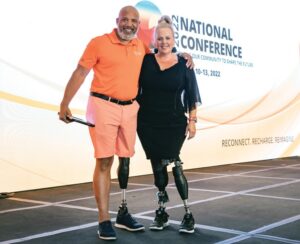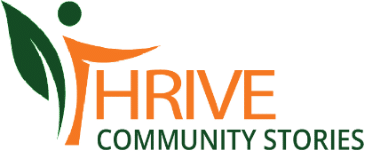 Advice from an unexpected source decades ago resonates with John Register to this day.
Advice from an unexpected source decades ago resonates with John Register to this day.
The Amputee Coalition executive board chair presented the second webinar of the Advocacy Forum series for Limb Loss and Limb Difference Awareness Month: The Power of Personal Narrative, Connecting Your Personal Story to Your Advocacy Work. The series continues Wednesday at 4 p.m. Eastern with Breaking Into Workforce Development with Amputee Coalition Workforce Development Manager Trenaya Reid.
Fittingly, Register began his webinar by telling a personal story. And, fittingly, it was one anybody could relate to, a technology fail.
The first time he was called to provide testimony before a committee of the U.S. House of Representatives, Register prepared meticulously.
When it was time to speak, he was ready to go. His laptop, however, was not.
The chairman of the committee grasped the situation and spoke up.
“He said, you know, sometimes it’s just better to speak from your heart,” Register said.
The lesson he took away was not that preparation is overrated. It was that your preparation should be rooted in your genuine story and authentic passion.
“No one can refute your story,” he said. “You own it. You own your story. I own my story.”
Register mapped four important stops on the journey from story to advocacy.
- Why your story matters
- Finding your story
- Bringing your story to life
- Connecting your story to advocacy work.
The first step is one of the Amputee Coalition’s values: Your story matters.
“It creates an emotional connection,” he said. “We create that emotional connection. We cannot deny that seeing a person living with a limb loss or living with a limb difference causes people to take a second look…
“We can take advantage of that as part of the story. We don’t have to negate it or push it away. We can actually embrace it.”
To move to the next step, finding your story, Register suggested thinking in terms of archetypes. Are you overcoming a monster? On a quest? Is it comedy, tragedy, a tale of rebirth?
Then there are the archetypical characters such as the hero, the mentor, and the villain.
Thinking this way allows you to put your story into context and add detail.
Once you have found it, you can bring it to life in your own fashion. This involves vivid details and sensory language, Register said.
When he tells his own tale as a motivational speaker, Register uses photos from the day he dislocated his left knee on a hurdle as an Olympic hopeful and the time he triumphed as a Paralympic champion.
That brings the audience forward.
“Then they’re in it,” he said. “No one’s going anywhere. It’s like they’re watching a movie. And the movie’s in their own mind. They’re playing it in their own mind.”
Connecting this to your advocacy work means finding elements of your story that shed light on the relevant case.
“There’s a face to the issue,” Register said. “And when there’s a face to the issue we begin to lean in more because we know this is a personal experience and not just some rhetoric that’s out there.”
Are you connected? Become a community member by joining the Amputee Coalition today!
Have you seen the Amputee Coalition’s new public service announcement campaign? Watch the Inspire to Elevate campaign now.

